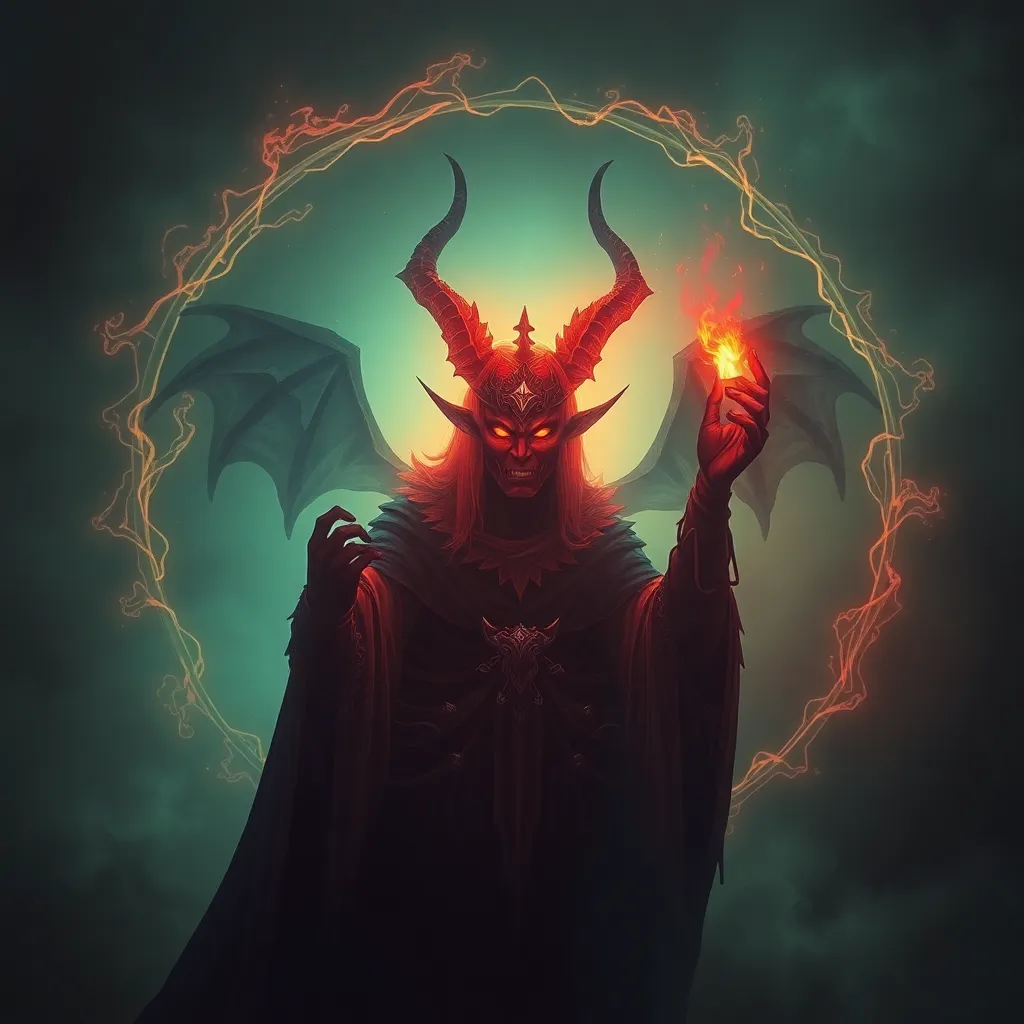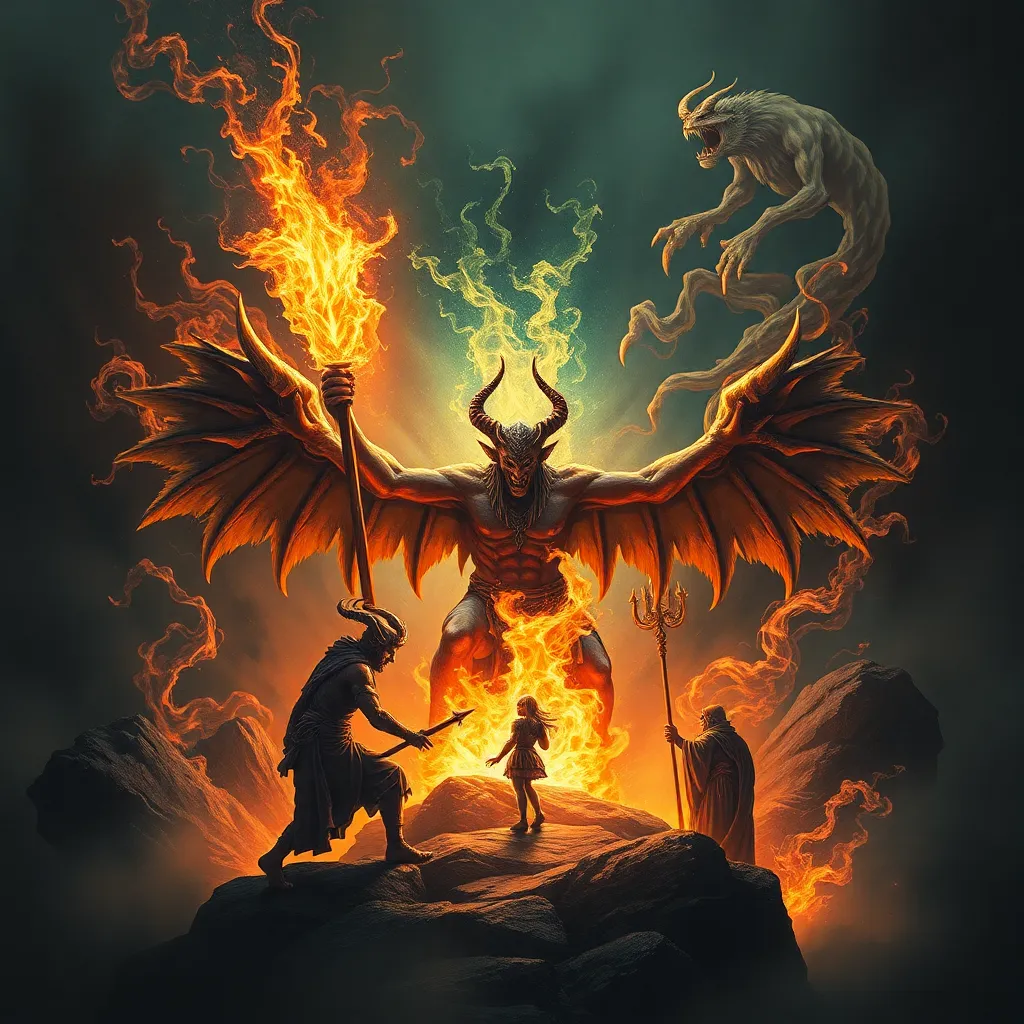The Empusa’s Curse: Investigating the Demon’s Power to Bring Misfortune and Death
I. Introduction
The myth of the Empusa has captivated the imaginations of many throughout history, weaving a tapestry of fear and intrigue. Often depicted as a seductive demon, the Empusa is said to possess the ability to cause misfortune and death. This article delves into the origins, nature, and cultural significance of the Empusa, exploring how its curse has impacted societies over the centuries.
In ancient cultures, demons like the Empusa served not only as figures of terror but also as reflections of societal fears and moral lessons. Understanding the significance of the Empusa within these contexts offers insight into human psychology and our response to the unknown. The purpose of this article is to explore the curse associated with the Empusa and its implications for both historical and modern societies.
II. Historical Origins of the Empusa
A. The earliest mentions in Greek mythology
The Empusa first appears in Greek mythology, often depicted as a shape-shifting demon that preys upon unsuspecting victims. According to ancient texts, particularly those by the playwright Euripides, the Empusa could transform its appearance to lure men, feeding off their life force or instilling fear in them.
B. Evolution of the Empusa’s character over time
Over time, the character of the Empusa has evolved from a singular figure in mythology to a more complex symbol of female seduction and danger. As the demon’s story was retold, it absorbed various cultural influences, leading to different interpretations across regions and periods.
C. Connections to other mythological figures
The Empusa is often linked to other mythological creatures, such as the Lamia and the Strix, both of which share similar traits of predation and transformation. This connection highlights the common themes found in mythological narratives regarding the dangers posed by feminine figures.
III. The Nature of the Curse
A. Description of the curse associated with the Empusa
The curse of the Empusa is often described as a malevolent force that brings misfortune, illness, and death. Victims of the curse may experience a series of unfortunate events, leading to societal ostracism or personal tragedy. The curse is characterized by:
- Sudden illness or inexplicable health issues
- Unforeseen accidents or financial ruin
- A sense of dread or psychological torment
B. Psychological and physical effects on victims
Victims of the Empusa’s curse report a range of psychological and physical effects, including anxiety, paranoia, and a general decline in health. The belief in the curse can exacerbate these issues, leading to a self-fulfilling prophecy where the fear of misfortune becomes a reality.
C. Cultural interpretations of misfortune and death
Throughout history, cultures have sought to explain misfortune and death through supernatural means. The Empusa serves as a symbol of these interpretations, embodying the fears surrounding illness and mortality. In various cultures, the demon represents a means of understanding human suffering and the unpredictable nature of life.
IV. Empusa in Folklore and Literature
A. Representation of the Empusa in ancient texts
In ancient literature, the Empusa appears in various forms, often as a cautionary tale about the dangers of succumbing to temptation. Euripides’ portrayal of the Empusa emphasizes its role as a seducer, warning against the perils of desire and the consequences of neglecting moral duties.
B. Modern adaptations and interpretations
In contemporary literature and media, the Empusa has been reinterpreted, often appearing in horror fiction and fantasy genres. These adaptations continue to explore themes of seduction, danger, and the unseen threats lurking in the shadows.
C. The role of the Empusa in storytelling and moral lessons
The Empusa’s presence in storytelling serves to convey moral lessons about the dangers of temptation and the importance of vigilance. By embedding these themes into narratives, cultures reinforce societal norms and values, using the demon as a tool for teaching caution and integrity.
V. Case Studies: Accounts of Misfortune Linked to the Empusa
A. Historical anecdotes of misfortune attributed to the demon
Throughout history, numerous anecdotes have surfaced linking misfortune to the Empusa. These stories often involve individuals experiencing a string of bad luck after encountering a mysterious woman or a series of unusual events.
B. Analysis of contemporary reports and experiences
In modern times, individuals still report experiences attributed to the Empusa. These accounts often reflect a deep-seated belief in the supernatural, with people interpreting their misfortunes through the lens of the curse. Common themes include:
- Isolation following a traumatic event
- Inexplicable health issues following a perceived encounter
- Financial difficulties after a significant life change
C. Psychological explanations for perceived curses
From a psychological perspective, the belief in curses, including that of the Empusa, can be explained by cognitive biases and the human tendency to find patterns in chaos. The concept of confirmation bias leads individuals to notice and remember incidents that align with their beliefs while ignoring contradictory evidence.
VI. The Empusa in Modern Culture
A. The demon’s influence in films, books, and art
The Empusa has left a significant mark on modern culture, appearing in films, literature, and art. Its representation as a seductive and dangerous figure resonates with contemporary audiences, capturing the essence of fear and fascination.
B. The resurgence of interest in supernatural folklore
As society becomes increasingly fascinated with the supernatural, tales of the Empusa and similar figures have gained renewed interest. This resurgence reflects a broader cultural trend towards exploring folklore and mythology as a means of understanding human nature.
C. The role of the Empusa in contemporary spirituality and witchcraft
In contemporary spirituality and witchcraft, the Empusa has been adopted into various practices, often symbolizing the darker aspects of the feminine divine. Practitioners may invoke the Empusa to explore themes of transformation, empowerment, and the acceptance of one’s shadow self.
VII. Debunking the Myth: Rational Explanations
A. Psychological factors behind the belief in curses
Understanding the psychological factors that contribute to the belief in curses is essential in debunking myths like that of the Empusa. Cognitive dissonance, the need for control, and fear of the unknown play significant roles in perpetuating these beliefs.
B. The role of societal fears and anxieties in perpetuating the myth
Societal fears, such as those surrounding illness, death, and the unpredictability of life, often find expression in myths like the Empusa’s curse. These narratives can serve as coping mechanisms, providing explanations for the inexplicable.
C. Scientific perspectives on superstition and folklore
From a scientific standpoint, folklore and superstition can be viewed as products of human cognition. The study of how myths like the Empusa arise, evolve, and affect human behavior can provide valuable insights into the nature of belief and the human experience.
VIII. Conclusion
In summary, the Empusa’s curse serves as a rich subject for exploration, revealing much about ancient societies and their fears. The demon’s representation in mythology, folklore, and contemporary culture illustrates the enduring impact of such myths on human consciousness.
Reflecting on the findings surrounding the Empusa’s curse highlights the intersection of mythology, fear, and cultural legacy. As long as humans grapple with the uncertainties of life, such myths will continue to provide a framework for understanding our deepest anxieties and desires.



